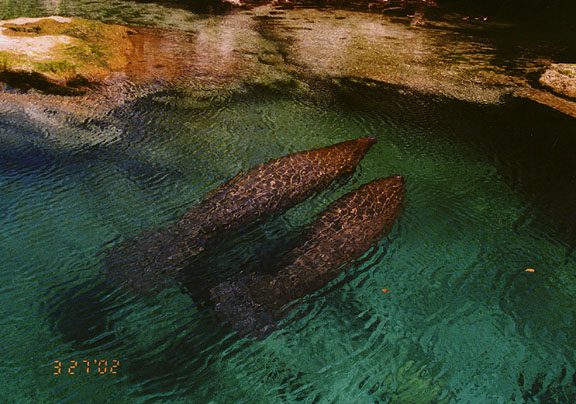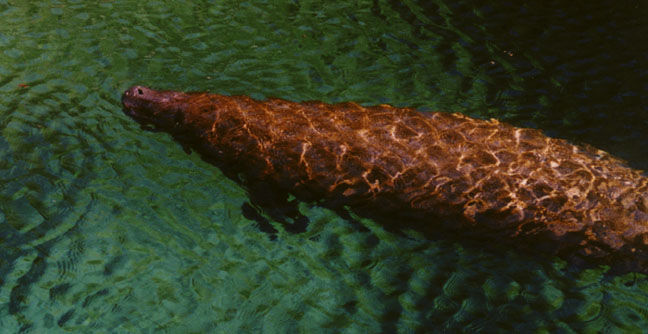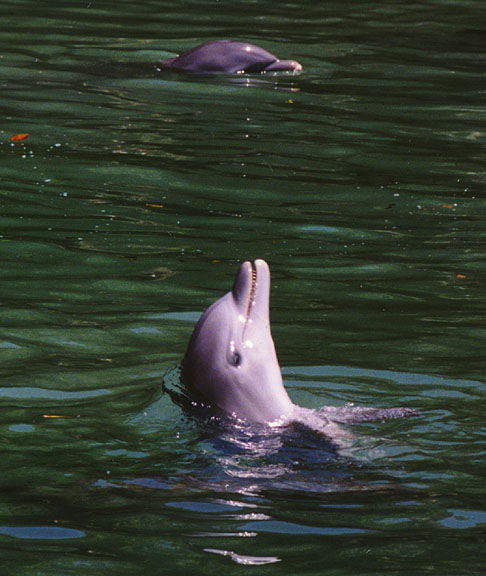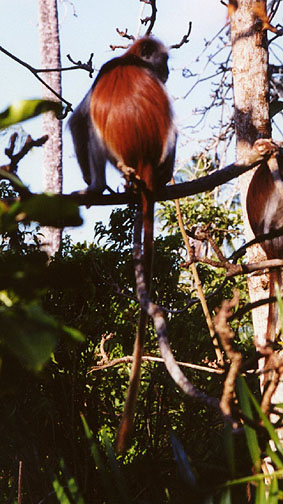

Photos of My Favorite Animals
Manatees in Florida
Along the coasts of Florida, Manatees (Sea Cows) feed on the stream vegetation. They are sensitive to temperature and move about with the seasons. Here is a photo of one eating heartily of hay provided by a State Park.

Photos of Manatees at Homosasas Springs Florida.
Manatees in Mexico

male and female

Dolphins in Mexico
Dolphin (aquatic mammal), fast-swimming animal related to whales and porpoises. Sleek and powerful swimmers found in all seas, dolphins are distinguished from porpoises by well-defined, beaklike snouts and conical teeth. The porpoise has a blunt snout, chisel-shaped teeth, and a stouter body.

Beluga Whales at Resolute Bay, Canada
At an inlet on Somerset island just South of Resolute Bay, Canada, the Beluga whales congregate in the summer to move about in shallow waters to remove a layer of skim by rubbing against the bottom.
A camp nearby called ARCTIC WATCH was set up for people to see this and other wildlife. I was there during the summer of 1996.

Cranes at Baraboo, Wisconsin
Cranes are a family of birds that have long been revered by people living near them. They are often endangered. The International Crane Foundation has aided in the preservation of all crane species. At their quarters in Baraboo, Wisconsin are individuals of all the world's cranes, which can be viewed by the public. Here is a photo of the female Whooping Crane in its habitat.

Link to International Crane Foundation
Komodo "Dragons"
The island of Komodo in Indonesia, is the home of the world's largest reptile, a monitor lizard (varanus komodoensis).
I visited this island in 1991 as part of a Smithsonian Institution tour.

More Komodo Monitor Lizard Photos
Koalas
Outside of Brisbane, Australia is the LONE PINE SANCTUARY
which is the home of over 100 KOALAS.

![]()
Photos of the bower of the Bowerbird of Australia
![]()
The "Gooney birds", Laysan albatross, of MIDWAY ATOLL.
During nesting season about 200,000 pairs use the island as their breeding
ground.


More Photos of Birds from Midway Atoll
![]()
Orang utan
Orangutan, great ape of Southeast Asia. Its name means "man of the jungle" in Malay, an Indonesian language. Orangutans live only on the island of Borneo and in the northern corner of the island of Sumatra. The orangutan spends most of its time in trees, using its long arms and hook-shaped hands and feet for grasping branches and vines. It seldom ventures to the ground, but when it does, it walks on all fours. Traveling through the treetops is difficult, so an orangutan only travels a few hundred meters each day. Each evening it builds a new treetop nest, often by bending down fronds of a betel tree. Older males, however, may travel and sleep on the ground. Orangutans are characterized by coarse, long, reddish-brown fur. Male orangutans average about 95 cm (37 in) in length and about 77 kg (170 lb) in weight. Females are smaller, reaching about 78 cm (31 in) in height and weighing only about 37 kg (81 lb). The male has puffy cheeks and a hanging throat-pouch. This pouch contains air sacks that help produce a groaning, bubbling call, which can be heard at least 1 km (0.6 mi) away. Half of the orangutanís diet consists of fruit, but these animals also eat young leaves, soft inner bark, termites, eggs, and occasionally monkeys. Orangutans accumulate fat in winter to prepare for the monsoon season in April through October, when food is scarce. Orangutans are solitary creatures. Except when mating, adults usually travel and forage for food independently. When a female is ready to mate, she will seek out an adult male. The pair will stay together for several days until the female is pregnant, then they will resume their solitary ways. The gestational period for orangutans is just under nine months, nearly the same as in human beings. Females give birth to a single infant about once every four to eight years. Infants stay very close to their mothers for the first three years until they are weaned. They spend the next three to five years becoming increasingly independent of their mother, gaining complete independence at about eight years of age. Occasionally, an adult female with a youngster will pair up with another adult female and her young for up to three days, during which time the youngsters play together. Although it is illegal to kill, own, or export orangutans, poaching continues. Also, the orangutan habitat is rapidly diminishing as a result of large-scale logging and burning of forests. The massive forest fires on Sumatra and Borneo in 1997 and 1998 killed thousands of orangutans and destroyed the habitat of thousands more, endangering the survival of the species. Scientific classification: The orangutan belongs to the family Pongidae. It is classified as Pongo pygmaeus.

![]()

Photos of Red Colobus of Zanzibar
![]()
King Penguin
The island of South Georgia is where the king penguin can be seen.
The king penguin is classified as Aptenodytes patagonica
African Lion
One place to view the African Lion is in the Masai Mara game reserve

Other Photos of African Animals in Tanzania
Other Photos of African Animals in Uganda
![]()
Return to Animal Favorites page
![]()